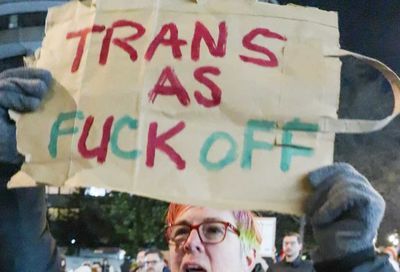Transgender woman sues Florida county sheriff’s office, alleging mistreatment while in jail
Karla Bello claims prison officials misgendered her and denied her access to hormones, violating her Eighth Amendment rights

A transgender woman is suing a Florida county sheriff’s office for mistreatment she alleged she suffered during an 11-day stint in jail for unpaid parking tickets.
Karla Bello, 37, a home health care worker, was incarcerated last November after missing a court date to address unpaid traffic tickets.
Bello says she was struggling financially at the time, and couldn’t pay them, or the $513 bail set for her release.
As a result, Bello was placed in the Pinellas County Jail for 11 days. At intake, she told prison officials she was a woman, but was nonetheless placed in the men’s housing quarters and repeatedly referred to by her “deadname,” which was still listed on her identification records.
“They stripped me of my identity,” Bello told Tampa Bay-area NPR affiliate WUSF in an interview. “Even though the whole world knows me as Karla, calls me ‘miss,’ they wanted to label me male, and they called me ‘sir,’ and it was very painful to have to endure that.”
Because she was treated by prison staff as a male, she lost access to her hair extensions, bra, and hormone medication — all of which were essential for treating her gender dysphoria.
Prison officials said she wasn’t entitled to hormones because she didn’t have a prescription.
As a result, Bello not only felt feelings of dysphoria return, but felt uncomfortable changing around male inmates, who made inappropriate comments toward her.
At one point, she tried using colored pencils as eye makeup, but officers told her she had to stop because inmates are not allowed to wear makeup. She began experiencing chest pains and other physical problems, as well as emotional stress.
By her seventh day in custody, she was suicidal and despondent. “I had decided, I can’t live with this, I’m going to die in here,” she said.
A transgender rights group heard about Bello’s situation and bailed her out with help from attorney Rook Elizabeth Ringer of Lento law Group.
Ringer is representing Bello in her current lawsuit against the Pinellas County Sheriff’s Office.
In the lawsuit, filed last Thursday in the U.S. District Court for the Middle District of Florida, Bello alleges that Sheriff Bob Gualtieri and 15 officers or prison staffers violated Bello’s right to equal protection by discriminating against her based on her gender identity, and denying her medical care, which is a form of “cruel and unusual punishment,” in violation of her rights under the Eighth Amendment.
See also: California bill would end policy forcing transgender women to be housed in men’s prisons
In addition to seeking damages, the lawsuit also calls upon Pinellas County to implement policies that will protect other transgender inmates from experiencing similar treatment, such as requiring them to be addressed using their proper names and pronouns.
“Pinellas County’s treatment of Ms. Bello is not only shocking, and as we believe, unlawful, but it shows the continuing prejudice transgender people face in Florida and across the United States,” Ringer said in a statement.
“No county official would dare place a non-transgender person in a jail housing unit that conflicted with their gender identity. And yet, that is exactly what Pinellas County sheriff’s officers and prison officials did with Ms. Bello for apparently no other reason than that she is a transgender person.”
According to the National Center for Transgender Equality, one in six transgender people have been incarcerated at some point in their lives.
Because most prisons house people based on their assigned sex at birth, rather than their gender identity, transgender inmates are more likely to suffer abuse while incarcerated. The situation is particularly dire for transgender women of color.
A spokesman for the sheriff’s office declined to comment on the lawsuit. But in a story published by the Tampa Bay Times in March, Gualtieri defended the decision to house Bello in with male prisoners, based on the county’s policy of assigning housing based on genitalia.
He has previously acknowledged that Bello was misgendered and said his office encourages deputies to respect a person’s pronouns.
Gina Duncan, the director of transgender equality for Equality Florida, told WUSF that treatment of inmates in Florida prisons can vary widely, depending on location.
She says Equality Florida has tried to train local police, including in Pinellas County, how to deal with transgender individuals in a respectful manner, adding that it’s “disappointing” to hear mistreatment of transgender inmates continues to occur.
“We just have to keep at it, and we have to call it out when it happens, and we have to denounce it when it happens, and then we need to keep training,” Duncan said. “And in the most forceful ways, push these agencies to truly make this a part of their corporate culture.”
Read more:
National LGBT Chamber of Commerce endorses Joe Biden, calls him ‘champion for inclusion’
UMass Amherst College Democrats issue apology to gay congressional candidate Alex Morse
Support Metro Weekly’s Journalism
These are challenging times for news organizations. And yet it’s crucial we stay active and provide vital resources and information to both our local readers and the world. So won’t you please take a moment and consider supporting Metro Weekly with a membership? For as little as $5 a month, you can help ensure Metro Weekly magazine and MetroWeekly.com remain free, viable resources as we provide the best, most diverse, culturally-resonant LGBTQ coverage in both the D.C. region and around the world. Memberships come with exclusive perks and discounts, your own personal digital delivery of each week’s magazine (and an archive), access to our Member's Lounge when it launches this fall, and exclusive members-only items like Metro Weekly Membership Mugs and Tote Bags! Check out all our membership levels here and please join us today!


























You must be logged in to post a comment.